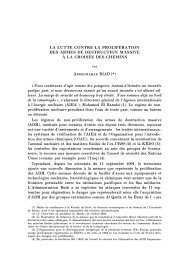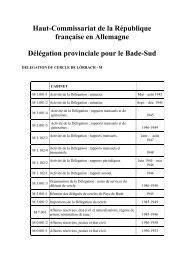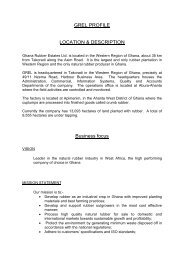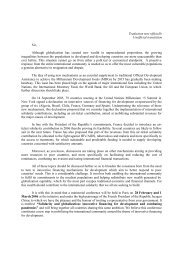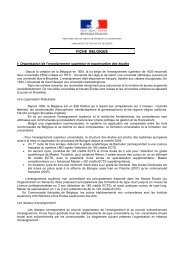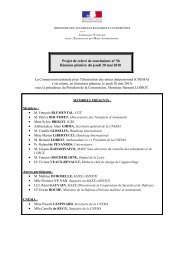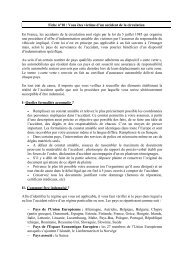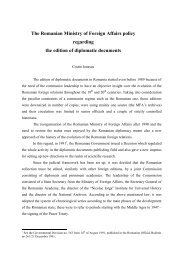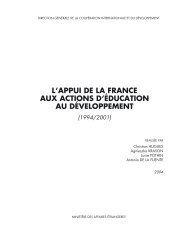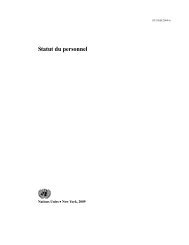An Ambivalent Relationship: Israel and the UN, 1945-1949
An Ambivalent Relationship: Israel and the UN, 1945-1949
An Ambivalent Relationship: Israel and the UN, 1945-1949
You also want an ePaper? Increase the reach of your titles
YUMPU automatically turns print PDFs into web optimized ePapers that Google loves.
<strong>An</strong> <strong>Ambivalent</strong> <strong>Relationship</strong>: <strong>Israel</strong> <strong>and</strong> <strong>the</strong> <strong>UN</strong>, <strong>1945</strong>-<strong>1949</strong><br />
Louise Fischer 1<br />
The relationship between <strong>Israel</strong> <strong>and</strong> <strong>the</strong> <strong>UN</strong> is a complex one. From <strong>the</strong> beginning<br />
<strong>Israel</strong> has appreciated <strong>the</strong> role played by <strong>the</strong> <strong>UN</strong> in <strong>the</strong> establishment of <strong>the</strong> State; on <strong>the</strong> o<strong>the</strong>r<br />
h<strong>and</strong> she has felt that <strong>the</strong> <strong>UN</strong> did not do enough to ensure her security. In this paper I will<br />
relate to <strong>the</strong> early years of <strong>the</strong> organization, when <strong>the</strong>se attitudes were being formed. In our<br />
publications <strong>the</strong>se issues are reflected in <strong>the</strong> documents of <strong>the</strong> Foreign Ministry <strong>and</strong> its<br />
predecessor, <strong>the</strong> Political Department of <strong>the</strong> Jewish Agency, <strong>and</strong> of course in documents from<br />
<strong>the</strong> <strong>UN</strong> archives. I shall also be quoting some unpublished documents by <strong>the</strong> <strong>Israel</strong>i foreign<br />
minister, Moshe Sharett, a selection of whose papers I am editing <strong>and</strong> hope to publish shortly.<br />
Sharett was identified with <strong>the</strong> <strong>UN</strong> more than any o<strong>the</strong>r <strong>Israel</strong>i political figure at that time, <strong>and</strong><br />
<strong>the</strong> ups <strong>and</strong> downs of his career reflect <strong>Israel</strong>’s relations with <strong>the</strong> <strong>UN</strong> <strong>and</strong> <strong>the</strong> international<br />
community. They also throw light on <strong>the</strong> question which was recently explored in a lecture by<br />
my colleague Dr Yehoshua Freundlich, why <strong>Israel</strong> did not develop “an orientation based on<br />
<strong>the</strong> <strong>UN</strong>” 2 . This was a formula used by <strong>the</strong> <strong>Israel</strong>i leadership in <strong>the</strong> early 1950s: when pressed<br />
to define <strong>the</strong>ir position between East <strong>and</strong> West, <strong>the</strong>y would say that <strong>Israel</strong> supported <strong>the</strong> <strong>UN</strong>.<br />
In fact, for various reasons, <strong>Israel</strong> gradually moved into <strong>the</strong> Western camp. But <strong>the</strong><br />
weaknesses of <strong>the</strong> <strong>UN</strong> itself, when dealing with <strong>the</strong> “Palestine question”, also played a part in<br />
this process.<br />
1 Editor, <strong>Israel</strong> State Archives<br />
2 Yehoshua Freundlich, unpublished lecture, ”Moshe Sharett <strong>and</strong> <strong>the</strong> <strong>UN</strong>”, (in Hebrew), 2004.
In February 1947 <strong>the</strong> <strong>UN</strong> was called upon to determine <strong>the</strong> future of Palestine. This<br />
territory, with its some 650,000 Jewish inhabitants <strong>and</strong> 1,200,000 Arabs, was still held under<br />
British M<strong>and</strong>ate. The Jews were determined to create a state of <strong>the</strong>ir own for <strong>the</strong>mselves <strong>and</strong><br />
<strong>the</strong> persecuted Jews of <strong>the</strong> world. The Arabs were equally determined to prevent <strong>the</strong>m, <strong>and</strong><br />
<strong>the</strong> question was what <strong>the</strong> <strong>UN</strong> could do to prevent a violent conflict with possible Great<br />
Power involvement.<br />
When <strong>the</strong> <strong>UN</strong> was founded in <strong>1945</strong>, <strong>Israel</strong>, which was not yet a state, was not unvited<br />
to <strong>the</strong> San Francisco conference. The Jewish Agency found it difficult to gain a hearing,<br />
despite <strong>the</strong> fact that Jewish units had fought on <strong>the</strong> side of <strong>the</strong> Allies in <strong>the</strong> Second World<br />
War. Five Arab states were among <strong>the</strong> participants. <strong>An</strong> unofficial representative of <strong>the</strong><br />
Agency, Eliahu Epstein (Elath), wrote of <strong>the</strong> advantage enjoyed by <strong>the</strong> Arabs, while <strong>the</strong> Jews<br />
were still in <strong>the</strong> position of beggars, seen "ei<strong>the</strong>r as nuisances or conspirators". 3<br />
Hanging around in <strong>the</strong> corridors of international institutions was not a new experience<br />
for <strong>the</strong> spokesmen of <strong>the</strong> Jewish Agency, an elected body representing <strong>the</strong> Zionist movement.<br />
The right of <strong>the</strong> Jews to immigrate to Palestine <strong>and</strong> to establish a Jewish National Home had<br />
been recognized by <strong>the</strong> League of Nations <strong>and</strong> included in <strong>the</strong> terms of <strong>the</strong> M<strong>and</strong>ate.<br />
However, <strong>the</strong> Jews <strong>the</strong>mselves were not represented at <strong>the</strong> League. In September 1937 Moshe<br />
Shertok, who later adopted <strong>the</strong> Hebrew name of Sharett, was attending a session in Geneva.<br />
He was forced to find seating in <strong>the</strong> press gallery. He wrote bitterly to a colleague of <strong>the</strong> need<br />
for direct representation: "Apart from <strong>the</strong> dire political necessity, it was morally humiliating<br />
for <strong>the</strong> representative of 17 million Jews to sit <strong>the</strong>re dumb <strong>and</strong> outside <strong>the</strong> Pale". 4 This inferior<br />
position was a forceful reminder of <strong>the</strong> need of <strong>the</strong> Jews for a state, <strong>and</strong> of <strong>the</strong> paradox that<br />
until <strong>the</strong>y had one, few would listen to <strong>the</strong>m.<br />
3 Political Documents of <strong>the</strong> Jewish Agency (PDJA), Vol I, May <strong>1945</strong>-December 1946, Jerusalem 1996, report<br />
by Eliahu Epstein, 30 th May <strong>1945</strong>, pp. 14-17.<br />
4 Central Zionist Archives (CZA), S25/1513, Moshe Shertok (Sharett) to Bernard (Dov) Joseph, 23 rd September<br />
1937.
At San Francisco <strong>the</strong> Arab states proposed to grant independence to all territories<br />
under trusteeship. In view of <strong>the</strong> Arab majority in Palestine, this proposal would have ensured<br />
<strong>the</strong> setting up of an Arab state. Although no specific territories were discussed at <strong>the</strong><br />
conference, an article in <strong>the</strong> <strong>UN</strong> Charter was accepted protecting existing rights under <strong>the</strong><br />
M<strong>and</strong>ate. However this meant little as long as <strong>the</strong> British continued with <strong>the</strong> restrictive policy<br />
<strong>the</strong>y had adopted in 1939, which largely prevented <strong>the</strong> immigration of Jewish Holocaust<br />
survivors to Palestine.<br />
During 1946 <strong>the</strong> Zionist movement was engaged in a bitter struggle with <strong>the</strong> British<br />
government, dem<strong>and</strong>ing control of immigration <strong>and</strong> establishment of a Jewish state in<br />
Palestine. From time to time <strong>UN</strong> trusteeship was proposed as an alternative. In fact as a<br />
M<strong>and</strong>atory power Britain was obliged to have <strong>the</strong> M<strong>and</strong>ate renewed by <strong>the</strong> <strong>UN</strong>, <strong>and</strong> <strong>the</strong><br />
Soviets had given notice of <strong>the</strong>ir intention to bring up <strong>the</strong> subject. Debate was postponed at<br />
Britain's request but it was clear that British rule could continue only if <strong>the</strong> <strong>UN</strong> decided on a<br />
trusteeship regime or if a move was made towards ano<strong>the</strong>r solution. The unofficial Zionist<br />
representative Nahum Goldmann regarded trusteeship as unrealistic. The trend of <strong>the</strong> <strong>UN</strong> was<br />
towards independence. If even Palestine's less developed neighbour, Transjordan, had<br />
received independence, it would be difficult to justify trusteeship for Palestine. Fur<strong>the</strong>rmore,<br />
<strong>the</strong> USSR was likely to object to a British or American role. 5<br />
By February 1947 Britain had despaired of finding a solution in Palestine <strong>and</strong> <strong>the</strong> British<br />
Foreign Secretary Bevin announced that his government had decided to transfer <strong>the</strong> problem<br />
to <strong>the</strong> <strong>UN</strong>. The secretary-general, Trygve Lie, proposed sending a commission of enquiry to<br />
Palestine. A Special Session of <strong>the</strong> General Assembly was called to appoint <strong>the</strong> commission.<br />
Bevin may have hoped that <strong>the</strong> <strong>UN</strong> would fail to find a solution <strong>and</strong> return <strong>the</strong> M<strong>and</strong>ate to<br />
Britain, free of her obligations to <strong>the</strong> Jews. Sharett noted that by transferring <strong>the</strong> debate to <strong>the</strong><br />
5 PDJA I, Nahum Goldmann to Moshe Shertok, 20 th February 1946, pp.279-283.
<strong>UN</strong>, Britain had forced <strong>the</strong> US, which had criticized her policy, to take a st<strong>and</strong> 6 . The US<br />
would ei<strong>the</strong>r have to share in responsibility for <strong>the</strong> solution or return <strong>the</strong> problem to Britain.<br />
But even if Britain still aspired to continue her rule in Palestine she lacked <strong>the</strong> necessary<br />
determination <strong>and</strong> resources to do so.<br />
In those early days of <strong>the</strong> <strong>UN</strong> great hopes were placed in <strong>the</strong> organization for <strong>the</strong><br />
creation of a new world order. As a result of <strong>the</strong> Holocaust many nations felt a particular<br />
responsibility to help <strong>the</strong> Jews achieve a state of <strong>the</strong>ir own. However <strong>the</strong> situation was<br />
complicated by rising Great Power rivalry. The USSR had an interest in dislodging Britain<br />
from her colonial holdings in <strong>the</strong> Middle East. The US, on <strong>the</strong> o<strong>the</strong>r h<strong>and</strong>, was concerned<br />
about <strong>the</strong> oil supply to Europe. Despite President Truman's support for Jewish immigration to<br />
Palestine <strong>and</strong> <strong>the</strong> influence of <strong>the</strong> pro-Zionist lobby, <strong>the</strong> State Department was anxious to<br />
keep Arab friendship. Thus <strong>the</strong> US opposed Lie's proposal for a Palestine commission<br />
including <strong>the</strong> Great Powers in order to keep <strong>the</strong> Soviets out.<br />
The majority of <strong>the</strong> <strong>UN</strong> at that time consisted of smaller states which were not<br />
committed to one of <strong>the</strong> blocs. At <strong>the</strong> Special Session which met at <strong>the</strong> end of April 1947 it<br />
was decided to send a Special Committee on Palestine (<strong>UN</strong>SCOP) to examine <strong>the</strong> problem,<br />
made up of representatives of <strong>the</strong>se states. The Arab states tried unsuccessfully to have<br />
Palestine discussed at <strong>the</strong> session itself. <strong>An</strong>ticipating this, <strong>the</strong> Jewish Agency dem<strong>and</strong>ed <strong>the</strong><br />
right to attend <strong>the</strong> Session <strong>and</strong> take part in discussions. After pressure from public opinion, <strong>the</strong><br />
Jewish Agency was allowed to appear before <strong>the</strong> Political Committee of <strong>the</strong> <strong>UN</strong>, toge<strong>the</strong>r<br />
with <strong>the</strong> Palestinian Arab representatives.<br />
11 countries were chosen to join <strong>the</strong> <strong>UN</strong>SCOP committee from Europe, Latin<br />
America, <strong>the</strong> British Commonwealth <strong>and</strong> Asia. Iran <strong>and</strong> India were seen as representatives of<br />
6 Moshe Shertok, Report on <strong>the</strong> Special Session of <strong>the</strong> General Assembly, Mapai (<strong>Israel</strong> Labour Party)<br />
Secretariat, 11 th June 1946, Mapai Archive, 24/47.
<strong>the</strong> Arabs' interests 7 .<br />
The Arab dem<strong>and</strong> that <strong>the</strong> primary aim of <strong>the</strong> committee be <strong>the</strong><br />
independence of Palestine was rejected. The committee was directed to visit Palestine <strong>and</strong><br />
any o<strong>the</strong>r country <strong>the</strong> members might choose, allowing <strong>the</strong>m to go to <strong>the</strong> DP camps in<br />
Europe.<br />
Sharett's strategy during <strong>the</strong> Session, particularly in approaching new nations like<br />
India, was to emphasize that Zionism was <strong>the</strong> national liberation movement of <strong>the</strong> Jews. He<br />
rejected Arab attempts to portray it as a tool of Western colonialism <strong>and</strong> argued that a Jewish<br />
state surrounded by Arabs would be forced to seek good relations with <strong>the</strong>m <strong>and</strong> to preserve<br />
<strong>the</strong> rights of its Arab minority 8 .<br />
At <strong>the</strong> close of <strong>the</strong> session <strong>the</strong> Soviet representative, <strong>An</strong>drei Gromyko, made a speech<br />
reversing traditional Soviet opposition to Zionism <strong>and</strong> expressing sympathy for <strong>the</strong> Jewish<br />
people's aspiration to a state. He added that Palestine should be independent <strong>and</strong> that <strong>the</strong><br />
USSR preferred a single-state solution. If Arabs <strong>and</strong> Jews could not reach agreement it would<br />
however support partition 9 . This policy did not reflect a definite decision to support partition,<br />
which was reached only in September 1947, but ra<strong>the</strong>r Soviet attempts to increase her<br />
involvement in <strong>the</strong> Middle East 10 .<br />
The change in <strong>the</strong> Soviet st<strong>and</strong> <strong>and</strong> <strong>the</strong> fact that <strong>the</strong> <strong>UN</strong> had recognized <strong>the</strong> Jewish Agency’s<br />
right to appear were encouraging signs for <strong>the</strong> Agency. Abba Eban, later <strong>Israel</strong>'s<br />
representative at <strong>the</strong> <strong>UN</strong>, concluded that, despite earlier pessimistic views, "<strong>UN</strong>O has an<br />
independent personality which cannot easily be suppressed at <strong>the</strong> dictates of a single great<br />
power." 11 The Zionists, who had earlier viewed <strong>the</strong> <strong>UN</strong> as a judicial tribunal, realized that it<br />
was more of a political body tending towards compromise <strong>and</strong> practical solutions. They<br />
7 PDJA Vol. II, January – November 1947, introduction, pp. xvi-xxii.<br />
8 CZA, report by Moshe Shertok of a conversation with <strong>the</strong> Indian ambassador, Asaf Ali; Moshe Shertok in <strong>the</strong><br />
Political Committee of <strong>the</strong> General Assembly, 12 th May 1947, At <strong>the</strong> Gate of <strong>the</strong> Nations, (in Hebrew), Am<br />
Oved, Tel Aviv, 1958, pp. 63-72.<br />
9 PDJA, Vol . II, Editorial note, p.368.<br />
10 Yehoshua Freundlich, "Moshe Sharett <strong>and</strong> <strong>the</strong> <strong>UN</strong>".<br />
11 PDJA, report by Aubrey (Abba) Eban, 14 th May 1947, p.362.
decided to co-operate with <strong>UN</strong>SCOP <strong>and</strong> to make every effort to obtain a favourable report.<br />
The Palestine Arabs, on <strong>the</strong> o<strong>the</strong>r h<strong>and</strong>, boycotted <strong>the</strong> committee. The British officials<br />
remained aloof <strong>and</strong> gave technical assistance only. Despite Zionist attempts to persuade <strong>the</strong><br />
US to exert its influence in <strong>the</strong>ir favour, <strong>the</strong> Americans preferred to remain neutral, in order to<br />
prevent Russian involvement. As a result a vacuum was formed which allowed <strong>the</strong> smaller<br />
states to play an active role 12 . The members of <strong>the</strong> committee, mostly ex-civil servants or<br />
judges, knew little of <strong>the</strong> dispute. But <strong>the</strong>y were courageous <strong>and</strong> independent-minded <strong>and</strong><br />
were determined to "grasp <strong>the</strong> nettle" <strong>and</strong> to find a clear-cut solution. 13<br />
<strong>UN</strong>SCOP visited Palestine from mid-June to mid- July 1947 <strong>and</strong> heard Zionist <strong>and</strong><br />
Government witnesses. In Lebanon <strong>the</strong>y met representatives of <strong>the</strong> Arab states who dem<strong>and</strong>ed<br />
an Arab state in all of Palestine, offering <strong>the</strong> Jews religious <strong>and</strong> cultural autonomy. The more<br />
moderate King Abdullah of Transjordan did not mention his plans to annexe <strong>the</strong> Arab areas of<br />
Palestine. At <strong>the</strong> end of July <strong>UN</strong>SCOP met survivors <strong>and</strong> <strong>the</strong>ir representatives in <strong>the</strong> DP<br />
camps. The committee was deeply impressed by <strong>the</strong>ir determination to reach Palestine <strong>and</strong> by<br />
<strong>the</strong> struggle of <strong>the</strong> Yishuv, <strong>the</strong> Jewish community in Palestine, against British rule. While<br />
terrorist acts by dissident Jewish organizations led to harsh British retaliation, <strong>the</strong> official<br />
Jewish organizations concentrated on illegal settlement <strong>and</strong> immigration, culminating in <strong>the</strong><br />
arrival of <strong>the</strong> immigrant ship "Exodus". The Chairman of <strong>the</strong> Committee <strong>and</strong> some of its<br />
members were present in Haifa to see Jewish immigrants forcibly transferred by British<br />
soldiers to ships for deportation back to Europe. <strong>UN</strong>SCOP concluded that British rule in<br />
Palestine had broken down <strong>and</strong> that <strong>the</strong> M<strong>and</strong>ate must go. Publicly <strong>the</strong> Zionists also<br />
dem<strong>and</strong>ed all of Palestine, but <strong>the</strong>y made it clear that <strong>the</strong>y would accept a Jewish state in an<br />
adequate area of <strong>the</strong> country if it was offered.<br />
12 Yehoshua Freundlich, From Destruction to Resurrection, Zionist Policy from <strong>the</strong> End of <strong>the</strong> Second World<br />
War to <strong>the</strong> Establishment of <strong>the</strong> State of <strong>Israel</strong> (in Hebrew), Tel Aviv, 1994, pp.96-97.<br />
13 Freundlich, Destruction, pp.100-101.
During <strong>the</strong> drafting of <strong>the</strong> committee report in Geneva, two sections emerged. The<br />
majority, comprising seven members, eventually recommended partition into two states,<br />
toge<strong>the</strong>r with an economic union; <strong>the</strong> minority (India, Iran <strong>and</strong> Yugoslavia) recommended a<br />
federal state with sovereignty in practice in <strong>the</strong> h<strong>and</strong>s of <strong>the</strong> Arabs; <strong>the</strong> Australian<br />
representative abstained. The Jewish state would include 62% of <strong>the</strong> country, including <strong>the</strong><br />
sou<strong>the</strong>rn desert area, <strong>the</strong> Negev, Eastern Galilee <strong>and</strong> <strong>the</strong> coastal plain. The Arab state would<br />
include most of <strong>the</strong> hill district, Western Galilee <strong>and</strong> Gaza. Jerusalem, despite its Jewish<br />
majority, was to come under <strong>UN</strong> trusteeship. The assistant secretary of <strong>the</strong> committee, Ralph<br />
Bunche of <strong>the</strong> USA, who had helped to draft <strong>the</strong> trusteeship provisions of <strong>the</strong> <strong>UN</strong> Charter,<br />
played a central role. His close contacts with <strong>the</strong> Zionists helped to ensure that <strong>the</strong> final<br />
partition plan would be acceptable to <strong>the</strong>m; however it is said that in fact he drafted both<br />
reports! 14<br />
The Zionists welcomed <strong>the</strong> majority report, <strong>and</strong> David Ben-Gurion, chairman of <strong>the</strong><br />
Jewish Agency, noted with satisfaction that it recognized <strong>the</strong> Jews' rights <strong>and</strong> called it <strong>the</strong><br />
“beginning of redemption." 15<br />
At <strong>the</strong> September General Assembly, East-West tension was increasing. Trygve Lie<br />
transferred consideration of <strong>the</strong> report to an Ad Hoc committee headed by <strong>the</strong> Australian<br />
Foreign Minister, Herbert Evatt. The head of <strong>the</strong> British delegation announced that his<br />
government would carry out <strong>the</strong> recommendations of <strong>UN</strong>SCOP only if both parties accepted<br />
<strong>the</strong>m, <strong>and</strong> would not impose a solution. The committee also discussed <strong>the</strong> borders of <strong>the</strong><br />
Jewish state, particularly <strong>the</strong> Negev which <strong>the</strong> British wanted awarded to <strong>the</strong> Arabs for<br />
strategic reasons. Thanks to Soviet opposition this was prevented. The Zionists, headed by<br />
Sharett, mounted an extensive political campaign. Sharett assured supporters, worried by<br />
14 W.R. Louis, The British Empire in <strong>the</strong> Middle East <strong>1945</strong>-1951. Quoted in Shabtai Rosenne, Bunche at Rhodes:<br />
Diplomatic Negotiator, in Extracts from an International Law Miscellany, Martinus Nijhoff Publishers,<br />
Dordrecht 1993, p.714.<br />
15 PDJA II, David Ben-Gurion to Paula Ben-Gurion, 2 nd September 1947, p.619.
Arab threats to resist partition, that <strong>the</strong> Jewish defence forces were able to ensure <strong>the</strong> security<br />
of <strong>the</strong> Yishuv. The Canadian representative, Lester Pearson, helped to draw up a compromise<br />
plan for <strong>the</strong> implementation of partition <strong>and</strong> evacuation of <strong>the</strong> British forces 16 .<br />
In his speech before <strong>the</strong> Ad Hoc committee Sharett rebutted <strong>the</strong> argument of <strong>the</strong> Arab<br />
states <strong>and</strong> <strong>the</strong>ir supporters that <strong>the</strong> <strong>UN</strong> Charter gave <strong>the</strong> Arab population self-determination<br />
<strong>and</strong> was an insuperable barrier to <strong>the</strong> establishment of a Jewish state in Palestine. He<br />
emphasized that <strong>the</strong> Jews were willing to adjust <strong>the</strong>ir right of self-determination to that of<br />
o<strong>the</strong>rs, but not to give it up. "We regard it as inconceivable that <strong>the</strong> justice <strong>and</strong> equality which<br />
<strong>the</strong> Charter enshrines should be destined for all mankind save <strong>the</strong> Jewish people." 17<br />
After <strong>the</strong> partition resolution had been passed in <strong>the</strong> Ad Hoc committee, <strong>the</strong> General<br />
Assembly voted on 29 th November 1947 with a two-thirds majority for <strong>the</strong> establishment of<br />
<strong>the</strong> Jewish state. The USSR, <strong>the</strong> US <strong>and</strong> France voted for <strong>the</strong> resolution: Britain abstained. 18<br />
The Palestine issue was regarded as a test case for <strong>the</strong> ability of <strong>the</strong> <strong>UN</strong> to solve<br />
complicated international problems. Many feared that its fate would be that of <strong>the</strong> League of<br />
Nations: paralysis <strong>and</strong> failure. Sharett noted that this factor brought some states which had<br />
been hesitant, such as France, to support <strong>the</strong> partition plan. During <strong>the</strong> debates it became clear<br />
that <strong>the</strong> alternative to partition was no solution at all, <strong>and</strong> <strong>the</strong>y did not want to be accused of<br />
responsibility for this situation 19 .<br />
At <strong>the</strong> General Assembly Shertok <strong>and</strong> Epstein, who were Russian born, worked<br />
closely with <strong>the</strong> Soviet delegation. After much vacillation, at <strong>the</strong> end of October 1947 <strong>the</strong><br />
USA had ab<strong>and</strong>oned its neutral stance <strong>and</strong> exerted its influence in favour of partition. This<br />
extraordinary co-operation between <strong>the</strong> two Powers meant that <strong>the</strong> <strong>UN</strong> was successful in<br />
outlining a solution to <strong>the</strong> dispute, at least from <strong>the</strong> Jewish point of view. The partition<br />
16 PDJA II, introduction; Freundlich, From Destruction, pp. 130-166.<br />
17 CZA, S25/7993, Statement of Moshe Shertok before <strong>the</strong> Ad Hoc Committee on <strong>the</strong> Palestine Question.<br />
18 PDJA II, introduction.<br />
19 CZA, Z5/2375, Meeting with Non-Zionist Organizations, 26 th October 1947.
esolution was regarded by Sharett as a major contribution to <strong>the</strong> legitimacy <strong>and</strong> security of<br />
<strong>Israel</strong>. However <strong>the</strong> <strong>UN</strong> did not become a central factor in <strong>the</strong> political thought <strong>and</strong> practice of<br />
<strong>Israel</strong>. Sharett's view was not shared by David Ben-Gurion, who became <strong>the</strong> first Prime<br />
Minister of <strong>Israel</strong>. Ben-Gurion, who also served as Minister of Defence <strong>and</strong> led <strong>the</strong> country<br />
during <strong>the</strong> 1948 war, was more impressed by <strong>the</strong> failure of <strong>the</strong> <strong>UN</strong> to ensure <strong>the</strong><br />
implementation of <strong>the</strong> partition resolution than by its achievements. His negative attitude<br />
towards <strong>the</strong> <strong>UN</strong> continues to influence <strong>the</strong> <strong>Israel</strong>i public <strong>and</strong> its policy makers to this day.<br />
The Arab states refused to accept <strong>the</strong> partition resolution <strong>and</strong> prepared to prevent by<br />
force <strong>the</strong> establishment of <strong>the</strong> Jewish state. Violent clashes with <strong>the</strong> Palestine Arabs had<br />
already begun. Britain, while officially remaining neutral, turned a blind eye to <strong>the</strong> infiltration<br />
of Arab volunteer fighters <strong>and</strong> arms. She refused to co-operate in <strong>the</strong> transfer of powers to <strong>the</strong><br />
Jewish <strong>and</strong> Arab authorities, but announced that she would withdraw her forces on 15 th May<br />
1948.<br />
The main factor preventing <strong>the</strong> <strong>UN</strong> from playing any significant role at this point was<br />
its failure to send an international force to enforce <strong>the</strong> resolution. The possibility of setting up<br />
a force had come up during <strong>the</strong> Assembly <strong>and</strong> in February 1948 Trygve Lie began to take<br />
soundings. However <strong>the</strong> Americans were determined not to take part, motivated by <strong>the</strong> fear<br />
that <strong>the</strong> Soviets would <strong>the</strong>n dem<strong>and</strong> a role. The vacuum created by <strong>the</strong> inaction of <strong>the</strong> Great<br />
Powers may have helped <strong>UN</strong>SCOP, but it also prevented <strong>the</strong> creation of an effective force.<br />
<strong>An</strong>o<strong>the</strong>r committee of small powers, <strong>the</strong> <strong>UN</strong> Palestine Commission, was set up to supervise<br />
<strong>the</strong> execution of <strong>the</strong> partition resolution. This committee remained in New York due to British<br />
obstruction. In March an advance party reached Jerusalem, already under siege, but was<br />
virtually ignored by <strong>the</strong> British 20 .<br />
20 Shabtai Rosenne, The United Nations <strong>and</strong> <strong>Israel</strong>'s War of Independence, in Extracts from <strong>An</strong> International<br />
Law Miscellany, Martinus Nijhoff Publishers, Dordrecht, 1993, pp. 642-653.
On 5 th March <strong>the</strong> Security Council decided to hold consultations of its members on <strong>the</strong><br />
violence in Palestine. These made it obvious that support for partition was waning,<br />
particularly in <strong>the</strong> US, due to Arab pressures <strong>and</strong> fears that <strong>the</strong> Jews could not withst<strong>and</strong> <strong>the</strong>ir<br />
attack. The State Department put forward trusteeship as an alternative, but Britain refused to<br />
act as trustee or to postpone its withdrawal. The main support for partition came from<br />
supporters of <strong>the</strong> <strong>UN</strong> idea, especially Dean Acheson, <strong>the</strong> US Assistant Secretary of State, <strong>and</strong><br />
Trygve Lie. They were dismayed by <strong>the</strong> danger to <strong>the</strong> prestige <strong>and</strong> effectiveness of <strong>the</strong> <strong>UN</strong> if<br />
members were able to frustrate its decisions by <strong>the</strong> use of force. 21<br />
A serious problem for <strong>the</strong> Jewish forces was <strong>the</strong> lack of heavy arms or planes. The<br />
USA had imposed a boycott on sales to both sides. Sharett was unsuccessful in persuading<br />
<strong>the</strong> <strong>UN</strong> to allow <strong>the</strong> Jews to buy arms 22 . On 15 th May 1948, following <strong>the</strong> Declaration of<br />
Independence by <strong>the</strong> Provisional Government of <strong>Israel</strong>, forces from Egypt, Syria, Trans-<br />
Jordan <strong>and</strong> Iraq invaded Palestine <strong>and</strong> penetrated deep into <strong>the</strong> Jewish state. Only <strong>the</strong> supply<br />
of arms by Czechoslovakia enabled <strong>the</strong> Jewish state to withst<strong>and</strong> <strong>the</strong> invasion. That same<br />
morning President Truman gave de facto recognition to <strong>the</strong> new state. Full recognition by <strong>the</strong><br />
USSR quickly followed. A resolution was passed to appoint a <strong>UN</strong> Mediator to try to bring<br />
about a peaceful settlement.<br />
Even if <strong>the</strong> <strong>UN</strong> had not succeeded in preventing war, it did play a part in management<br />
of <strong>the</strong> crisis <strong>and</strong> setting up machinery for a ceasefire. On 15 th May <strong>the</strong> <strong>Israel</strong>i representative<br />
asked <strong>the</strong> Security Council to declare that conditions in Palestine constituted a threat to peace<br />
<strong>and</strong> to call on <strong>the</strong> Arab states to end <strong>the</strong>ir aggression. A resolution calling for a truce was<br />
passed by <strong>the</strong> Security Council, which came into effect on 11 th June 1948. The Swedish<br />
diplomat Count Folke Bernadotte was appointed as a Mediator <strong>and</strong> an organization of Truce<br />
21 Rosenne, The <strong>UN</strong>, pp.649-651;Political <strong>and</strong> Diplomatic Documents (PDD), December 1947-May 1948, ISA,<br />
Jerusalem, 1979, introduction, xv-xxiii.<br />
22 PDD, M. Shertok , Address at Meeting of <strong>the</strong> United Nations Palestine Commission, 15 th January 1948, pp.<br />
173-174.
Observers set up which exists to this day. In July <strong>the</strong> Arabs renewed <strong>the</strong> fighting. After <strong>Israel</strong><br />
had taken control of areas assigned to <strong>the</strong> Arab state in Western Galilee <strong>and</strong> around<br />
Jerusalem, <strong>the</strong> Security Council imposed a second truce. Bernadotte pressed <strong>the</strong> <strong>Israel</strong>i<br />
government to agree to his plan for a settlement. Never<strong>the</strong>less <strong>the</strong> limitations of <strong>the</strong> <strong>UN</strong>’s role<br />
as a peacemaker were becoming apparent. Bernadotte <strong>and</strong> his staff failed to implement some<br />
of <strong>the</strong> provisions of <strong>the</strong> ceasefire <strong>and</strong> were believed to favour <strong>the</strong> Arabs 23 . It was rumoured<br />
that he was under British <strong>and</strong> American influence. He proposed <strong>the</strong> annexation of <strong>the</strong> Arab<br />
parts of Palestine to Transjordan, considered a British dependency, <strong>and</strong> <strong>the</strong> return of <strong>the</strong> Arab<br />
refugees who fled or were forced to leave <strong>the</strong>ir homes during <strong>the</strong> fighting. While Galilee<br />
should go to <strong>Israel</strong>, part of <strong>the</strong> Negev should be given to <strong>the</strong> Arab state. Reports spread that he<br />
also proposed <strong>the</strong> separation of Jerusalem from <strong>Israel</strong>.<br />
Jerusalem had been cut off from <strong>the</strong> rest of <strong>the</strong> country during <strong>the</strong> war <strong>and</strong> religious<br />
<strong>and</strong> cultural institutions, including churches, were damaged in <strong>the</strong> fighting. <strong>Israel</strong> felt that <strong>the</strong><br />
international community had hardly lifted a finger to help. The war left Jerusalem in effect<br />
partitioned between <strong>Israel</strong> <strong>and</strong> Transjordan, <strong>and</strong> <strong>Israel</strong> was determined not to relinquish<br />
control of her part of <strong>the</strong> city.<br />
In September 1948 Bernadotte was assassinated by members of <strong>the</strong> Lehi (Stern Gang)<br />
terrorist group. Bernadotte was replaced by his assistant, Bunche. Britain <strong>and</strong> <strong>the</strong> US<br />
attempted to carry out <strong>the</strong> Bernadotte plan at <strong>the</strong> <strong>UN</strong> General Assembly of September 1948.<br />
The <strong>Israel</strong>i delegation dem<strong>and</strong>ed adherence to <strong>the</strong> 1947 partition resolution in order to prevent<br />
<strong>the</strong> detachment of <strong>the</strong> Negev from <strong>Israel</strong>. At <strong>the</strong> same time, in order to justify retaining <strong>Israel</strong>'s<br />
conquests beyond <strong>the</strong> 1947 borders, <strong>the</strong>y claimed that <strong>the</strong> resolution was no longer relevant to<br />
<strong>the</strong> situation on <strong>the</strong> ground. Their success was largely due to <strong>Israel</strong>'s military strength (at this<br />
time she completed <strong>the</strong> expulsion of Egyptian forces from most of <strong>the</strong> Negev). As Sharett<br />
23 Documents on <strong>the</strong> Foreign Policy of <strong>Israel</strong> (DFPI), Vol 1, introduction, pp.xiii-xxiv.
explained to <strong>the</strong> Cabinet at <strong>the</strong> end of October 1948, <strong>the</strong>re was little enthusiasm at <strong>the</strong> <strong>UN</strong> to<br />
use military force to expel <strong>Israel</strong> from positions given to her by <strong>the</strong> 1947 resolution 24 .<br />
Never<strong>the</strong>less <strong>the</strong> session ended with a diplomatic defeat. The <strong>Israel</strong>i leadership<br />
opposed <strong>the</strong> return of <strong>the</strong> Palestinian refugees after <strong>the</strong> war. They were reluctant to increase<br />
<strong>the</strong> Arab minority <strong>and</strong> believed that <strong>the</strong> refugees would soon be integrated in <strong>the</strong> Arab states.<br />
However resolution 194 was adopted calling on <strong>Israel</strong> to allow refugees who wanted to return<br />
to do so. <strong>Israel</strong> postponed her response to this dem<strong>and</strong> to future peace negotiations. The<br />
resolution also reaffirmed <strong>the</strong> internationalization of Jerusalem <strong>and</strong> set up a Conciliation<br />
Commission to advance a peace settlement 25 .<br />
The <strong>UN</strong> played an important part in <strong>the</strong> negotiation of <strong>the</strong> armistice agreements which<br />
ended <strong>the</strong> war. <strong>Israel</strong> had already sought admission to <strong>the</strong> <strong>UN</strong>, but <strong>the</strong> ceasefire left her<br />
without recognized<br />
borders. Few states outside <strong>the</strong> Eastern bloc had accorded her full<br />
recognition. Bunche was able to exploit her need for international recognition <strong>and</strong> foreign aid<br />
to induce her to make concessions. During <strong>the</strong> first six months of <strong>1949</strong> <strong>Israel</strong> signed armistice<br />
agreements with Egypt, Transjordan, Lebanon <strong>and</strong> Syria. While <strong>the</strong> agreement with<br />
Transjordan was achieved in direct negotiations, Bunche, with a combination of bullying,<br />
charm <strong>and</strong> drafting skill, played an important part in <strong>the</strong> compromises which led to <strong>the</strong> o<strong>the</strong>r<br />
agreements 26 . The demarcation lines were worked out in military subcommittees. Decried as<br />
long <strong>and</strong> unworkable, <strong>the</strong>se borders have shown <strong>the</strong>ir relevance in recent months.<br />
In January <strong>1949</strong> Sharett discussed <strong>Israel</strong>’s relations with <strong>the</strong> <strong>UN</strong> in a speech at a party<br />
forum. <strong>Israel</strong> would not automatically obey every dem<strong>and</strong> of <strong>the</strong> <strong>UN</strong>, but she should not lay<br />
herself open to <strong>the</strong> accusation of open defiance of its authority. He emphasized that <strong>the</strong> <strong>UN</strong><br />
was not an abstract concept, with a separate existence apart from <strong>the</strong> member states.<br />
Never<strong>the</strong>less international public opinion exists <strong>and</strong> regards <strong>the</strong> <strong>UN</strong>, with all its weaknesses,<br />
24 M. Shertok, Cabinet Minutes, 26 th October 1948.<br />
25 DFPI, Vol 2, introduction, pp. xi-xiv.<br />
26 Rosenne, Bunche at Rhodes, pp. 713-719.
as "<strong>the</strong> last resort which may succeed in preventing <strong>the</strong> outbreak of a new world<br />
catastrophe…" <strong>An</strong>y state which endangers world peace is seen with great suspicion, <strong>and</strong> <strong>Israel</strong><br />
must do her best not to alienate <strong>the</strong> <strong>UN</strong>. But if her vital interests are involved, <strong>and</strong> she is sure<br />
that her case is justified, condemnation by <strong>the</strong> <strong>UN</strong> may be unavoidable. Even <strong>the</strong>n, Sharett<br />
did not see <strong>the</strong> <strong>UN</strong> as <strong>the</strong> determining factor in making <strong>Israel</strong>i policy 27 .<br />
In May <strong>1949</strong> <strong>Israel</strong> was admitted to <strong>the</strong> United Nations. After her first official<br />
application for membership was unsuccessful, <strong>the</strong> application was renewed with <strong>the</strong> signing<br />
of <strong>the</strong> armistice with Egypt. On 11 th May <strong>1949</strong> Sharett took his seat as <strong>the</strong> <strong>Israel</strong>i delegate at<br />
<strong>the</strong> General Assembly, <strong>the</strong> fulfillment of a personal <strong>and</strong> national dream. On his return to <strong>Israel</strong><br />
Sharett emphasized <strong>the</strong> responsibilities as well as <strong>the</strong> benefits of <strong>UN</strong> membership. Many of<br />
those who had supported <strong>Israel</strong> did so from a desire to right a historic wrong. They would<br />
hold <strong>Israel</strong> to high moral st<strong>and</strong>ards <strong>and</strong> expect her to act as a force for peace <strong>and</strong> progress <strong>and</strong><br />
not only to follow her own interests. 28<br />
In <strong>the</strong> coming years Cold War tensions <strong>and</strong> <strong>the</strong> refusal of <strong>the</strong> Arab states to make<br />
peace with <strong>Israel</strong> led relations with <strong>the</strong> <strong>UN</strong> to sour. The “Middle East dispute” was rarely<br />
absent from <strong>the</strong> agenda. Hopes that <strong>the</strong> Conciliation Council <strong>and</strong> <strong>the</strong> Lausanne Conference<br />
would transform <strong>the</strong> Armistice Agreements into a comprehensive peace settlement did not<br />
materialize. The Agreements did not resolve fundamental issues, <strong>and</strong> contained many<br />
compromises <strong>and</strong> deliberate ambiguities. The <strong>UN</strong> Mixed Armistice Commissions set up to<br />
deal with border incidents were ineffective. <strong>Israel</strong> believed that <strong>the</strong>y were hostile <strong>and</strong> that <strong>the</strong><br />
Security Council took Arab violations of <strong>the</strong> border lightly. From 1953 on <strong>the</strong> Soviet Union<br />
began to support <strong>the</strong> Arab states <strong>and</strong> repeatedly used <strong>the</strong> veto against <strong>Israel</strong> in <strong>the</strong> Security<br />
Council. The perception that <strong>the</strong> <strong>UN</strong> could not be relied on to defend <strong>Israel</strong>'s security was one<br />
of <strong>the</strong> factors leading to <strong>the</strong> decline in influence of <strong>the</strong> Foreign Ministry. In 1956 Sharett<br />
27 M. Shertok, Speech to <strong>the</strong> Mapai Council, 12 th January <strong>1949</strong>.<br />
28 M. Sharett, Cabinet Minutes, 24th May <strong>1949</strong>.
himself was ousted from <strong>the</strong> position of Foreign Minister <strong>and</strong> <strong>the</strong> military <strong>and</strong> security<br />
establishment took <strong>the</strong> lead in determining policy, a process clearly reflected in our<br />
documents. Never<strong>the</strong>less <strong>Israel</strong> as a small state dependent on larger Powers could not turn her<br />
back on <strong>the</strong> world <strong>and</strong> <strong>the</strong> <strong>UN</strong> continued to play an important role in her affairs.



